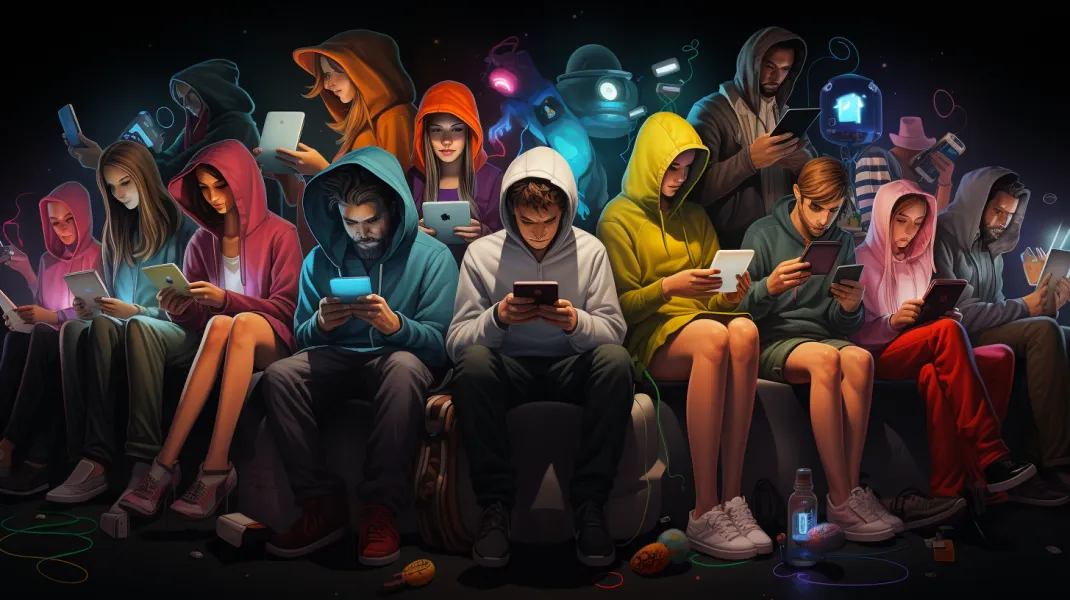

Daniel MacDougall
“We’re training and conditioning a whole new generation of people that when we are uncomfortable or lonely or uncertain or afraid, we have a digital pacifier for ourselves. That is kind of atrophying our own ability to deal with that.” - Tristan Harris, former design ethicist at Google and co-founder of Centre for Humane Technologies
A new term has emerged to encapsulate the emotionally charged, short attention span, cognitive slumping teens and young adults. The phrase is TikTok brain. The app became wildly popular during the pandemic. Teens and young adults trapped in isolation spent countless hours zombie scrolling through video shorts and posting their own content, and it's beginning to raise serious concerns.
TikTok is a social media app where users can upload or watch short video clips ranging from 3 seconds to 10 minutes. What makes this video streaming app so desirable and addictive for teens and young adults could be the way the app chooses content. The algorithm tailors content based on interactions, account settings, and hashtags you follow, and it's incredibly simple to use, setting the viewer up for countless hours of footage specific to their interests, keeping the interaction going. The most popular video length ranges from 24 to 31 seconds, and some users even find videos over one minute stressful.
The phrase TikTok brain has become a bit of an insult, a term used in interviews and social settings where people are insulted for their short attention spans and foggy cognitive functions, and rightly so. There appears to be a generation of teens merging into the world with attention spans lasting only 30 seconds, necessitating adaptations in communication methods for teachers and adults, but should they have to? It's very hard to justify a change because someone has spent a portion of their life addicted to social media, and now has issues paying attention in the real world.
So, how is this affecting teens and young adults, what are parents supposed to do about this, and why is it causing depression, memory loss, and anxiety?
A Chinese study conducted in 2021 proved the link between stress, anxiety, depression, and memory loss (1). This study involved 3036 high school students in China and sought out the students with TikTok use disorder (TTUD). The study found that "TikTok use disorder (TTUD) is positively linked to memory loss, and it is also positively linked to depression, anxiety, and stress. Depression, anxiety, and stress are positively linked to memory loss (1)." The study did piggyback off of other studies, but did make some intersting points. There are plenty of studies proving correlations between social media use with depression and anxiety disorders, which has become common knowledge. If addictive social media use - especially TTUD- is present, then this affects the cognitive faculties of developing young minds. Abuse of social media applications can lead to mood disorders, thus increasing negative memory function, and given how addictive TikTok is, this can exacerbate these problems.
So, why is this app so addictive and disrupting our minds?
A study conducted in January 2023 by Paul B. Tchounwou gave some insite. Tchounwou followed a link between a person's flow state during problematic TikTok use and parental mediation involvement. The study showed that when adolescents watch these short clips, their attention enters a flow state of mind, or a term called being in the zone. In a flow state of mind, one is engrossed in the activity with feelings of energized focus. The term usually refers to heights of alertness for athletes, musicians, surgeons, and other high-concentration activities in the real world. Typically, during and after these flow states within the real world, considerable achievements are accomplished. Individuals are proud of what they have created for themselves or others. People tend to do great things to the best of their capabilities and are associated with good feelings afterward, but with TikTok, one enters this flow state and accomplishes nothing but wasting time. Developing a loop cycle of looking for that flow state, producing good feelings, and no reward at the end.
At one point in our history, entering into a flow state of mind could mean the difference between life and death. Now, your child is entering it while zombie scrolling clips on the couch.
So, what is the parental part in all of this? The same study looked into the parent mediation theory of screen time. Parent mediation theory involves parental strategies and guidance for their child's social media use. Mediation includes controlling the length of time for TikTok use, educating children on social media use, and being involved with their children during TikTok use.
The study found that active parental control is effective in reducing problematic TikTok use with teens. Education between parents and teens is a crucial step to diverting teen addiction to social media use and building a competent guide to their child's behavior and interactions with social media platforms.
"Active parental mediation refers to the discussion between parents and children about the media’s content and what they watch; this method can mitigate the possibility of adverse consequences, such as aggressive behavior or distorted worldview formation (2)."
Another reason TikTok is so addictive for teens could be due to their shortened attention spans, to begin with. Many teens are predisposed to seek out activities with low effort and maximum rewards, even when those rewards are not there after the activity, and "the algorithmic recommendation system behind this platform is constantly calculated and rehearsed (2)." The app is brilliant at finding the right content for the viewer to keep the interest going, and content creators have found a time niche. Videos from 24 to 31 seconds are the most popular, and possibly programming young minds to have an attention span lasting 30 seconds.
What is to be done? Active parental mediation is effective in reducing problematic TikTok use. Education for parents and children is crucial. Teens and parents should be knowledgeable on the advantages and disadvantages of TikTok, and form guidelines for social media use with their children and how they interact in digital spaces. If you or your child has to use TikTok, limit the time spent with the app. Focus on material that is beneficial to your overall health and well-being. If you find yourself beginning to mindlessly watch content, close the app and do something better with your life. Or, delete the app…
Weekly Side Quest:
Try cutting your social media time in half. I know for some of you this could be a bit of challenge to find something to do to fill those gaps. Or, if you want to step it up, stop all social media apps for a week. Tell your friends about it. You trying something new. You can do this and it's very easy.
There's plenty more content for the curious mind. Stay tuned and join our newsletter for the latest articles.
Author's note: none of the writing was generated or made by AI. Our mission is provide a human touch to our journeys together. Thankyou always, Daniel MacDougall…

